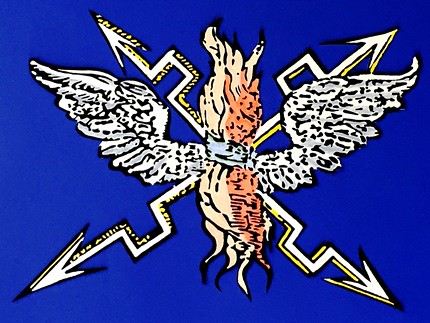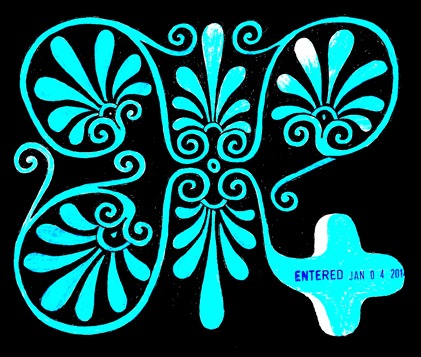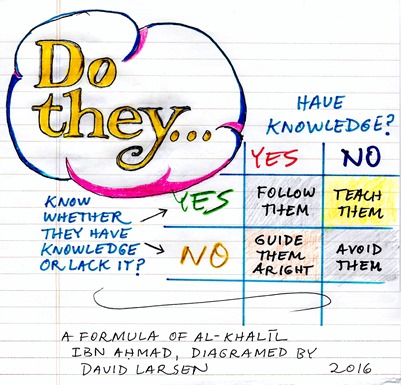Al-Būm ("The Owl") is said for the male bird, and
al-Būma ("The Owless") for the female.
Al-Ṣadā ("The Night Cry") and
al-Fayyād ("The Strutter") are said for the male only.
The female is called by the filionyms:
Umm al-Kharāb ("Mother of Ruins") and
Umm al-Ṣibyān ("Mother of Boys"), and is also called
Ghurāb al-layl ("Crow of the Night").
Al-Jahiz says that along with al-ṣadā, ghurāb al-layl and al-būma,
al-Hāma ("The Vengeful Head")
al-Ḍuwa‘ ("The Night Terror") and
al-Khaffāsh, ("The Bat") are all of a type, i.e. nocturnal flying creatures that leave their homes at night. He goes on to say that some of them feed on mice, sparrows, geckoes and small reptiles, and that others live on tiny insects.
It is in the owl's nature to break into the nests of all other birds, kick them out, and feed on their eggs and chicks. Its powers are greatest by night, when it remains awake. At night, no bird is capable of defending against it. If it is spotted by other birds in the daytime, they will kill it and pluck out its feathers, so great is the enmity between them and the owl. For this reason, hunters will bait their nets with [the carcass of] the owl, as a trap for other birds to fall into.
[In a now-inextant work, perhaps his Book of Problems and Experiences,] al-Mas‘udi says that al-Jahiz said that the owl imagines itself to be the most handsome of the animals, and that its high opinion of its own beauty is the reason it is only seen by night: for fear of the evil eye, it refuses to go out by day.
Among the falsehoods spread by the early Arabs is that after the soul of a slain or otherwise deceased person is separated from its body, it takes the form of a bird and screeches from atop that person's grave. The form it takes is that of the owl called the ṣadā, mentioned by the poet Tawba ibn al-Humayyir, one of the great lovers among the Arabs (meter: ṭawīl):
Though stone and a slab of wood be my covering,
when I am greeted by Laylā al-Akhyaliyya,
joyfully I will return her greetings, and if not
a screeching ṣadā will greet her on my behalf beside my grave.
The story is told that when Laylā passed by Tawba's grave and recited these verses, something like a bird rose from from the earth and startled her camel, which threw her to her death, and that she was buried there by Tawba's side.
There is more than one kind of owl, but they all love privacy and solitude, and are by nature enemies of the crow. In Ibn al-Najjār's History, it is told that Chosroes ordered his servant: "Hunt down for me the worst of birds, roast it over the worst of firewood, and serve it to the worst of men." So the servant killed an owl, roasted it over a fire of oleander-wood, and fed it to a slanderer.
In chapter 47 of The Lamp of Kings, the imam Abū Bakr al-Turtūshi tells that one night when the caliph ‘Abd al-Malik ibn Marwān was unable to sleep, he called for a courtier to help him pass the time in nocturnal conversation. It was in the course of this that the courtier said: "There is a she-owl in Mosul, O Commander of the Faithful, and in Basra there is another. On behalf of her son, the Mosuli owl asked the Basran owl for her daughter's hand in marriage. 'Not unless you pay me a bride-price of one hundred ruined estates,' said the owl of Basra. 'I can't offer you that right now,' the owl of Mosul responded, 'but if our present governor - God save him! - remains in his post for one more year, I will fulfill it.' " At this, ‘Abd al-Malik was brought to his senses, and took a role in hearing criminal cases and rendering justice to the people, and pursued inquiries into his governors' affairs.
I have seen it in written in the hand of a major scholar in a certain codex that al-Ma'mūn once looked down from his palace and saw a man standing at the foot of the wall, and writing on it with a piece of coal. He said to one of his servants, "Go see what that man is writing, and bring him to me." The servant sped down to the man and, seizing him, took in what he had written. It was this (meter: basīṭ):
O castle, repository of badness and blame,
when will the owl build its nest in your corners?
The day when that happens will be my delight:
among dry-eyed mourners, I will take first place.
"You'll answer to the Commander of the Faithful for this," said the servant. "I beg of you, by God, do not take me to him," said the man. "There is no other way," said the servant, and escorted him off.
When the man was brought before the king, the servant made known what he had written. "Woe betide you!" said al-Ma'mūn. "What inspired you to write this?" The man said:
"O Commander of the Faithful, you are well aware of all the wealth your castle's treasurehouses contain, and the clothes and jewelry, the food and drink, the beds and furniture and fine vessels, the slave-girls and eunuchs, and other goods surpassing my powers of description and comprehension. Passing by it in the furthest extreme of hunger and poverty, I fell to contemplating my own state, and asked myself, 'What good is there for me in this lofty castle's prosperity while I starve?' If it lay in ruins, I would not lack for stone and lumber, and firewood and nails that I might sell and have enough to live on by the revenue. Or does the Commander of the Faithful not know the words of the poet (meter: ṭawīl):
If a man has no stake in another mans's rule, nor shares
in its benefits, his thoughts will turn to its fall.
It's not out of hate, only desire for something else,
that he longs for the the state's overthrow.
Al-Ma'mūn told his servant, "Give him a thousand dinars," then said to the man, "Every year, as long as this castle prospers its tenants, this sum is yours." Here is another pair of verses on the same theme (meter: ṭawīl):
If you are in government, do a good job of it.
Soon enough you will pass away and leave it behind.
How many lords of state have the days swept away
whose fiefdoms were double your own?
Legal rulings. It is forbidden to eat every sort of owl. Al-Rāfi‘ī said that Abū ‘Āṣim al-‘Abbādī compared owls to vultures in this regard - the ḍuwa‘ [= the curlew?] as well as the būm. Al-Shāfi‘ī, God have mercy on him, said that the flesh of the ḍuwa‘ was not forbidden. The affirmation that ḍuwa‘ and būm are separate species is contravened by [al-Jawharī's dictionary, entitled] the Ṣaḥāḥ (Correct Usage), according to which al-ḍuwa‘ is said for all nocturnal birds, but belongs to the genus of the owl. And al-Mufaḍḍal says al-ḍuwa‘ is a male owl. So whatever one says about the ḍuwa‘ must be true for the būm also. Male and female are of one species, and the same dietary code applies to both, as [al-Nawawī says] in Garden of the Seekers: "The prevailing opinion is that al-ḍuwa‘ belongs to the genus of the owl. We rule that it is forbidden to eat it."
Useful information. Ibn al-Sunnī says [in The Work of Day and Night, no. 623] that al-Hasan ibn ‘Alī ibn Abī Talib (may God exalted be pleased with him) narrated: "The Prophet, God's blessings and peace be upon him, said: 'If a man recites the call to prayer in the right ear of his newborn child, and the iqāma into the left ear, the child will not be afflicted by Umm al-Ṣibyān.'" This was the practice of ‘Umar ibn ‘Abd al-‘Azīz, may God have mercy on him. Opinion is divided on the meaning of Umm al-Ṣibyān here. Some say it is the owl, while others say it is the effect of demonic possession.
Magical properties. When an owl is killed, one of its eyes remains open while the other closes. If the ball of the open eye is placed beneath the gemstone of a ring, anyone who wears the ring will remain awake as long as it is on their finger. And the other eye has the inverse property. "If you cannot tell the eyes apart," al-Tabari says, "put them in water. The wakeful eye will float, and the sleep-inducing eye will sink to the bottom."
Hermes said that if you take the heart of an owl and put it in the left hand of a sleeping woman, she will begin to speak about everything she did that day. And if the heart is removed from a large owl, wrapped in a piece of wolfskin, and bound to the upper arm, its wearer will be protected from thieves and night-crawlers and will not fear anyone.
If the bile of an owl is smeared around the eyes, it improves vision. And if the fat of an owl is rendered and smeared around the eyes, night scenes will be viewable as if by day.
The owl lays two eggs, one fertile and one barren. To tell them apart, prick them with a feather. The fertile egg will be shown by [the movement of?] the feather.
Dream interpretation. The owl seen in a dream indicates a crafty thief, and some say it indicates a fearsome king so dreaded by his subjects that they suffer liver damage. It symbolizes heroism and the cessation of fear, because it is one of the birds of the night. And God knows best.
From The Greater Life of Animals by Kamal al-Din al-Damiri









